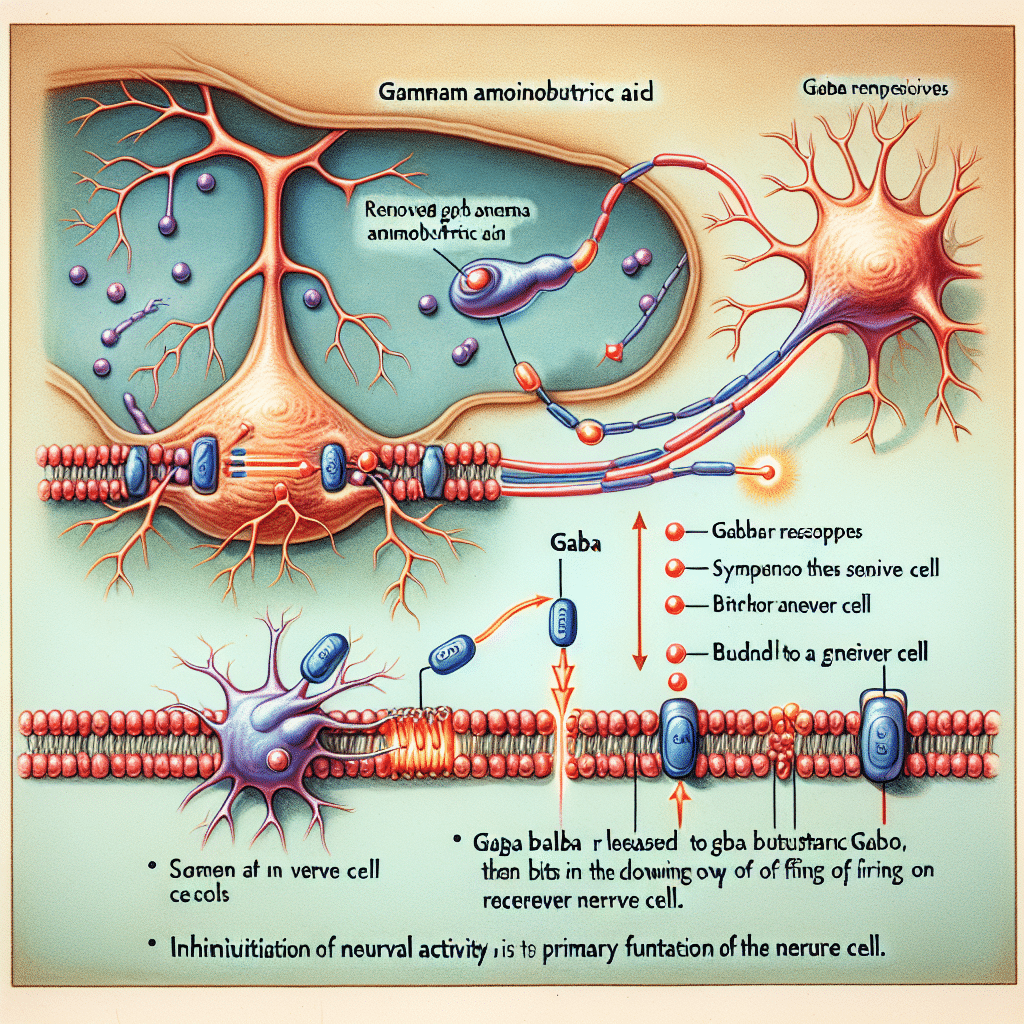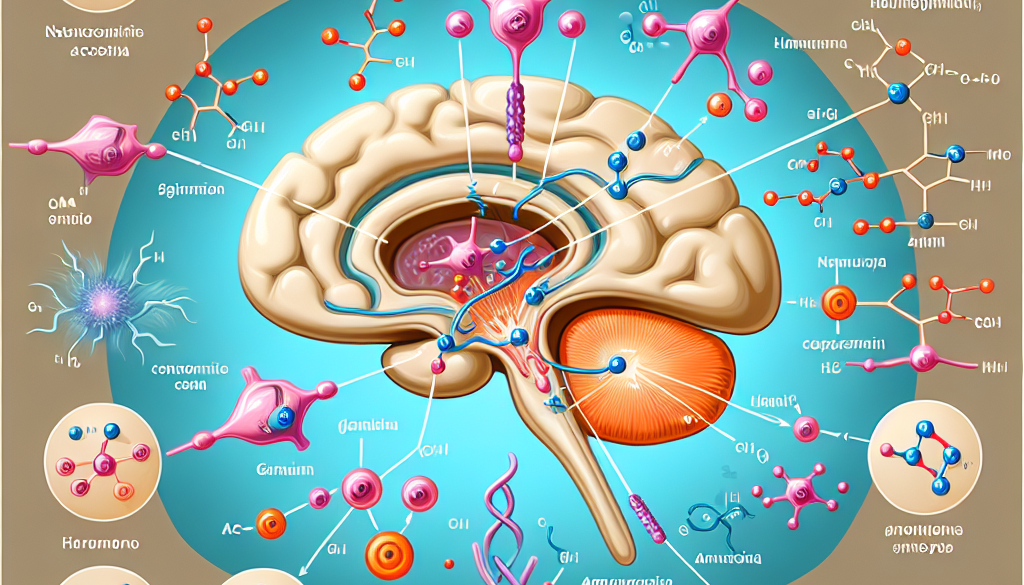Function of Gamma Aminobutyric Acid
-
Table of Contents
- Gamma Aminobutyric Acid: Understanding Its Crucial Role in the Nervous System
- The Neurotransmitter GABA: An Overview
- How GABA Functions in the Brain
- Effects of GABA on the Human Body
- Therapeutic Applications of GABA
- Case Studies and Research on GABA
- Statistics on GABA and Its Impact
- Conclusion: The Significance of GABA in Health and Disease
- Discover ETprotein’s High-Quality Protein Products
Gamma Aminobutyric Acid: Understanding Its Crucial Role in the Nervous System

Gamma Aminobutyric Acid (GABA) is a naturally occurring neurotransmitter that plays a critical role in the regulation of neuronal excitability throughout the nervous system. In humans, GABA is directly responsible for the regulation of muscle tone and can have a profound impact on an individual’s mental and physical health. This article delves into the function of GABA, exploring its mechanisms, effects, and potential therapeutic applications.
The Neurotransmitter GABA: An Overview
GABA is the chief inhibitory neurotransmitter in the mammalian central nervous system. It works by binding to specific receptors in the brain, which in turn leads to a decrease in neuronal excitability. This inhibitory effect of GABA is essential for maintaining the balance between neuronal excitation and inhibition, which is crucial for normal brain function.
How GABA Functions in the Brain
The primary function of GABA in the brain is to inhibit nerve transmission, preventing overexcitement and maintaining a state of balance within the nervous system. This is achieved through two main types of GABA receptors: GABAA and GABAB.
- GABAA Receptors: These are ionotropic receptors that mediate fast synaptic inhibition in the central nervous system. When GABA binds to these receptors, it causes an influx of chloride ions into the neuron, leading to hyperpolarization and a decrease in the likelihood of an action potential firing.
- GABAB Receptors: These are metabotropic receptors that are linked to potassium channels. Activation of GABAB receptors leads to slow inhibitory effects, which are longer-lasting than those mediated by GABAA receptors.
Through these receptors, GABA plays a pivotal role in a variety of physiological and psychological processes, including sleep regulation, muscle relaxation, and stress reduction.
Effects of GABA on the Human Body
GABA’s inhibitory actions have a wide range of effects on the human body, influencing everything from mood to muscle tone. Here are some of the key effects:
- Reducing Anxiety: GABA has a natural calming effect on the brain, which can help alleviate feelings of anxiety and stress.
- Enhancing Sleep: By inhibiting neural activity, GABA can facilitate sleep and improve the quality of rest.
- Regulating Muscle Tone: GABA is involved in controlling muscle tone and can prevent muscle spasms and stiffness.
- Neuroprotection: GABA has neuroprotective properties, helping to shield the brain from potential damage due to excessive neuronal activity.
Therapeutic Applications of GABA
Given its role in the nervous system, GABA has become a target for various therapeutic applications. Here are some areas where GABA supplementation or modulation is being explored:
- Treatment of Anxiety Disorders: GABA-enhancing medications, such as benzodiazepines, are commonly prescribed for the treatment of anxiety disorders due to their ability to increase GABA activity.
- Sleep Disorders: GABA supplements are often used to promote relaxation and improve sleep quality in individuals with insomnia.
- Epilepsy: Since GABA can inhibit excessive neuronal firing, GABAergic drugs are used to control seizures in patients with epilepsy.
- Neuropathic Pain: GABA analogs, such as gabapentin, are used to treat neuropathic pain by modulating GABAergic transmission.
Case Studies and Research on GABA
Research into GABA’s effects has been extensive, with numerous studies highlighting its importance in various health conditions. For instance, a study published in the “Journal of Clinical Psychiatry” found that patients with panic disorder had significantly lower levels of GABA in their brains compared to healthy individuals. This suggests a potential link between GABA deficiency and the development of anxiety disorders.
Another study in the “Journal of Neurology, Neurosurgery & Psychiatry” showed that GABAergic drugs could significantly reduce the frequency of seizures in patients with epilepsy, providing strong evidence for GABA’s role in modulating neuronal excitability.
Statistics on GABA and Its Impact
Statistics from various health organizations indicate that conditions potentially related to GABAergic dysfunction, such as anxiety disorders and epilepsy, are widespread. For example, according to the World Health Organization (WHO), an estimated 264 million people worldwide suffer from anxiety disorders. The Epilepsy Foundation reports that 1 in 26 people in the United States will develop epilepsy at some point in their lives, underscoring the importance of GABAergic interventions.
Conclusion: The Significance of GABA in Health and Disease
In conclusion, GABA’s role as the primary inhibitory neurotransmitter in the central nervous system is vital for maintaining a balance between neuronal excitation and inhibition. Its effects on anxiety, sleep, muscle tone, and neuroprotection highlight its importance in both health and disease. Therapeutic applications that target GABAergic systems offer hope for individuals suffering from a range of neurological and psychiatric conditions.
Discover ETprotein’s High-Quality Protein Products
If you’re interested in enhancing your health and well-being, consider exploring ETprotein’s range of protein products. Their offerings, including organic rice protein, pea protein, and various seed proteins, provide a solid foundation for a balanced diet. Additionally, ETprotein’s L-(+)-Ergothioneine products come in various grades suitable for pharmaceutical, food, cosmetic, and other industries. With a commitment to non-GMO, allergen-free, and high-purity ingredients, ETprotein stands as a leader in the protein supplement market.
About ETprotein:
ETprotein, a reputable protein and L-(+)-Ergothioneine (EGT) Chinese factory manufacturer and supplier, is renowned for producing, stocking, exporting, and delivering the highest quality organic bulk vegan proteins and L-(+)-Ergothioneine. They include Organic rice protein, clear rice protein, pea protein, clear pea protein, watermelon seed protein, pumpkin seed protein, sunflower seed protein, mung bean protein, peanut protein, and L-(+)-Ergothioneine EGT Pharmaceutical grade, L-(+)-Ergothioneine EGT food grade, L-(+)-Ergothioneine EGT cosmetic grade, L-(+)-Ergothioneine EGT reference grade and L-(+)-Ergothioneine EGT standard. Their offerings, characterized by a neutral taste, non-GMO, allergen-free attributes, with L-(+)-Ergothioneine purity over 98%, 99%, cater to a diverse range of industries. They serve nutraceutical, pharmaceutical, cosmeceutical, veterinary, as well as food and beverage finished product distributors, traders, and manufacturers across Europe, USA, Canada, Australia, Thailand, Japan, Korea, Brazil, and Chile, among others.
ETprotein specialization includes exporting and delivering tailor-made protein powder and finished nutritional supplements. Their extensive product range covers sectors like Food and Beverage, Sports Nutrition, Weight Management, Dietary Supplements, Health and Wellness Products, and Infant Formula, ensuring comprehensive solutions to meet all your protein needs.
As a trusted company by leading global food and beverage brands and Fortune 500 companies, ETprotein reinforces China’s reputation in the global arena. For more information or to sample their products, please contact them and email sales(at)ETprotein.com today.












